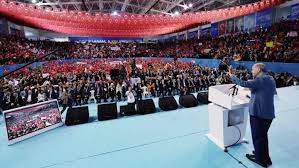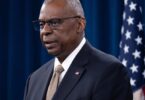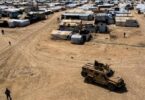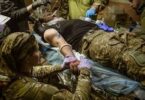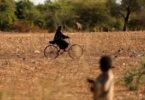ANKARA (AFP): Turkish President Recep Tayyip Erdogan stares down from a campaign poster at the earthquake ruins of Antakya, inspiring confidence in Ahmet Gulyildizoglu ahead of Sunday’s election runoff.
Millions across the ravaged region defied expectation and voted for the man who has ruled Turkey for two decades and fell just short of securing another five-year term on May 14.
Erdogan’s secular rival, Kemal Kilicdaroglu, “does not fill you with hope,” Gulyildizoglu said in front of a debris-strewn expanse once occupied by his six-floor apartment building.
“On the other hand, you have an alliance that keeps their promises,” the pensioner added, referring to Erdogan’s Islamic-rooted party and its far-right allies.
Erdogan’s ability to maintain support across Turkey’s southeastern disaster zone contributed to Kilicdaroglu’s disappointing showing in the first round, which he ended trailing by nearly five points.
The Turkish leader is now the strong favourite, capping a remarkable turnaround.
Seething anger at the government’s stuttering response to the February disaster, in which more than 50,000 died, put Erdogan in the unfamiliar position of issuing public apologies.
But Berk Esen, an associate professor at Istanbul’s Sabanci University, called Erdogan’s election rebound “not very surprising”.
Esen argued that the region is filled with pious voters who trusted Erdogan’s explanation that the massive toll resulted from an unavoidable act of nature — not state negligence over lax building standards.
In addition, “the opposition did not campaign heavily in the area and could not offer an alternative, credible message,” Esen told AFP.
– ‘Depot for migrants’ –
Instead of giving up, Kilicdaroglu is radically changing course.
Ditching his embracing vows to heal Turkey’s social divisions, Kilicdaroglu has struck a stridently nationalist tone, pledging to expel millions of Syrians and other migrants.
The message resonates in Syria-border cities such as Antakya, a mountain-rimmed cradle of civilisations once known as Antioch.
Kilicdaroglu has plastered Antakya with posters declaring: “The Syrians will go”.
“We will not turn Turkey into a depot for migrants,” the 74-year-old said on a visit to Antakya on Tuesday.
The tough talk pleased Mehmet Aynaci, 20, who blames Syrians for local housing problems.
“Before the earthquake, if you looked for a flat, there were a lot of Syrians,” Aynaci said.
“Of course they must go,” added Atilla Celtik, who like Aynaci is one of the few who has not left the almost completely deserted city.
“They will be asking for our land in the future,” he said. “We are worried.”
– Hurt feelings –
The historically liberal lean of Antakya’s Hatay province gave Kilicdaroglu a slight edge here over Erdogan in the first round.
It was one of just three of the 11 quake-hit provinces to vote against the incumbent.
Kilicdaroglu’s future success will depend in part on how many people who left the disaster zone are willing to make a second trip back for the runoff.
Nearly 1.7 million of the displaced failed to change their registration address by an April 2 deadline, meaning they must come back to vote.
Sema Sicek, whose anger at Erdogan is just as strong as the days when thousands slowly died under the debris while the government unwound its response, thinks they simply must.
“Walk if you have to but don’t give up on your land,” the 65-year-old said, accusing Erdogan of “burying us alive”.
Some of that fury has spilled over onto social media, where survivors were targeted for backing Erdogan.
The Turkish leader mentions these messages often on the campaign trail, trying to blame them on Kilicdaroglu.
Gulyildizoglu’s daughter Hatice said the attacks stung.
“This really offended us,” she said. “Our grief is immense. You have to live it to understand.”
– ‘Anti-Turk’ –
Erdogan has won votes with pledges to build victims new homes by early next year — “maybe a little later” for those in Antakya.
Kilicdaroglu is trying to do the same, telling Tuesday’s rally that “nobody should ever doubt” his ability to rebuild the region.
But Hakan Tiryaki, the provincial head of Kilicdaroglu’s leftist party, is sensitive to complaints that the opposition did not make its voice heard enough before the first round.
Campaigning any harder might have given the impression that the opposition was trying to profit from people’s grief, Tiryaki told AFP.
It might also have failed to change the mind of voters such as Omer Edip Aslantas, 51, who remembers chatting with other leftists about developing Turkey in the 1970s.
“The Turkish left is no longer the same,” he said in Kirikhan, a northern Hatay district that backed Erdogan.
“They have become anti-Turk, anti-Muslim.”

